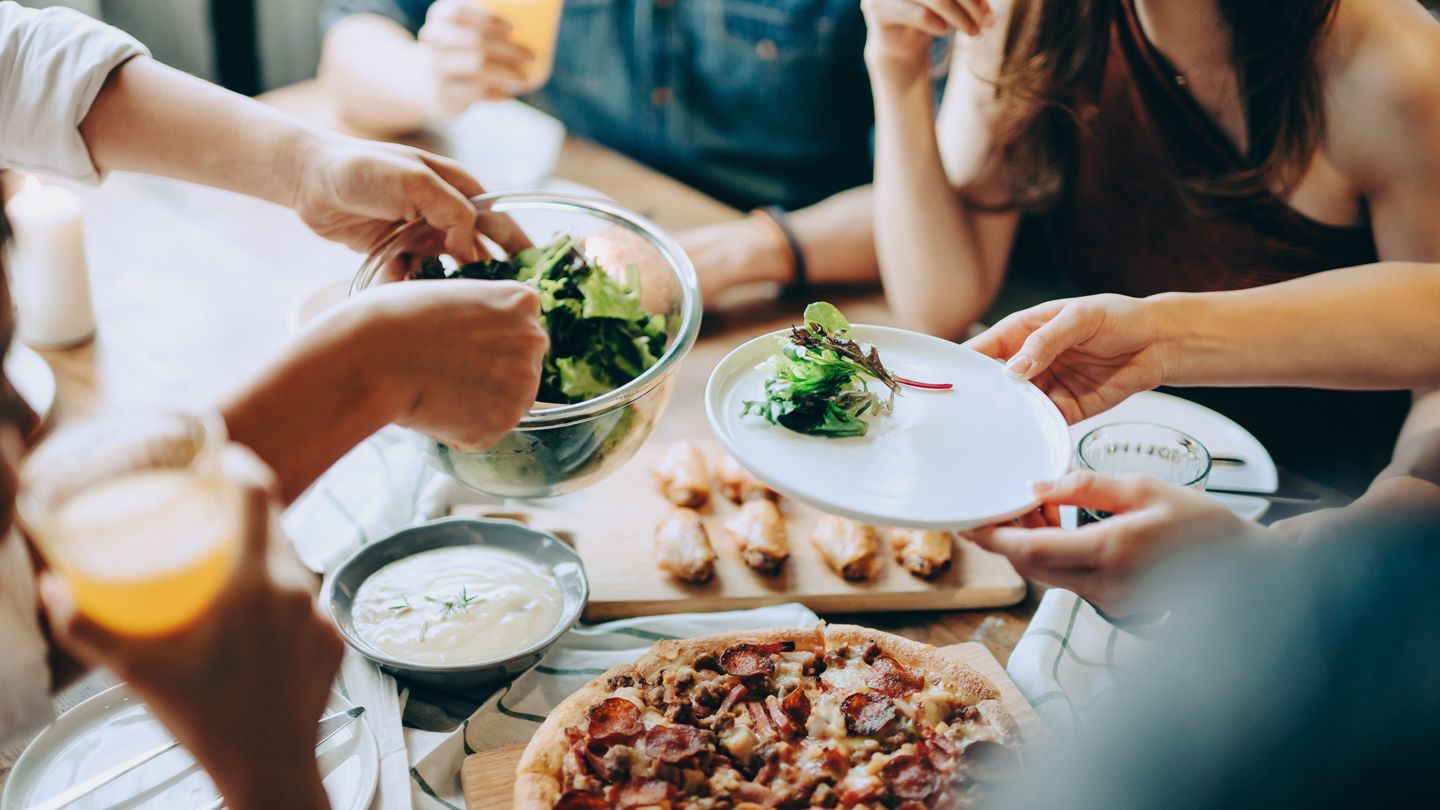Getty ImagesContinue reading When-Youre-Trying-to-Lose-Weight-but-Not-Your-Fam-1440×810
You’re on a weight loss journey and want to practice healthy habits, but your friends and family aren’t on the same path. Instead, they become obstacles to your goals.
That’s a bummer, to say the least. You’d think they’d cheer you on, right? But the reality is, not all of them do. In fact, says one study, “negative social support” for weight loss is common, showing up as “sabotage, collusion, and being a feeder.” (1)
Why does this happen? One basic reason is that people tend to resist change, so they may undermine your weight loss, either intentionally or unintentionally. And when they do, it can be difficult to resist the pressure to revert back to your old eating habits, especially if you tend to want to please others.
Still, you can manage to stay on track. “It’s your body, your health, and your weight — and only you can be the one to affect it,” says Sue Rose, RD, a private-practice licensed dietitian/nutritionist.
With that in mind, here are five tough scenarios you may experience with friends and family over a meal, and how to handle them so you can safeguard your weight loss goals.
1. Your Loved One Insists on Sharing at a Restaurant
Previously when you’d go out to eat, maybe you’d split a bottle of wine and load up on appetizers. Nowadays, you may have changed the way you order at a restaurant, and the experience isn’t the same. As a result, your loved one might push back — or not understand.
The good news is that you can still enjoy yourselves — and you can stick to your plan — by making a tweak or two.
First, don’t just consider what you can’t eat anymore, but also what you can add to the meal, suggests Lainey Younkin, RD, a weight loss dietitian.
So if you order shared foods, add something to them to make them healthier. For example, you can go out for pizza, but add veggies — which are lower in calories and contain filling fiber — via toppings or a side salad.
Second, eat less of the dish — like two pieces instead of your usual four.
Also, if your friend or partner wants to share an app, you can split the one they choose or suggest one that’s more in line with your goals, Younkin says. This way, you can stick to your diet without adhering to a set of rigid eating rules that make you uncomfortable.
That said, you don’t have to share food just because your dining companion asks you to (remember that people-pleasing tendency?). It’s okay to politely decline with a “no thanks” and say you’re going to order your own dish this time. No long explanations required. You could also have a healthy snack before you go, so you won’t be as hungry at the restaurant.
2. Your Relative Pushes the Dish They Made on You
We’re all proud of our signature dish, whether that’s to-die-for chocolate chip cookies or a beloved pasta salad. But when someone badgers you to eat the food they made, things can get uncomfortable fast.
“Everyone has an opinion on weight loss and diets. Move the conversation away from weight loss and bring it to how you feel,” says Younkin. For example, if they criticize what’s on your plate, you can say, “I feel better when I eat like this” or “I’m eating this way because I felt bloated during our last event.”
Additionally, Younkin says that people tend to notice what you put on your plate versus what you actually eat. So, if a loved one is insistent that you “eat” a certain food, you can take a small portion and ultimately leave it on your plate (if you feel comfortable doing this). Just keep in mind this could be difficult, so if you think you might eat it and later feel guilty, skip this one.
Bringing your own healthy dish to share could also help, so you know you have something to eat that aligns with your weight loss goals.
3. No One Wants to Eat the Way You Do at Home
If your family members subconsciously want things to stay the same, they may whine and complain about your diet — and it’s tempting to buckle under the pressure for the sake of harmony. This is when you need to be open with your family about your new health journey. Explain that they are still welcome to eat their favorite foods, but dinners might look different now.
“If you’re the cook, the family should eat what you’re eating,” says Rose. “You should not be a short-order cook just because you’re on a wellness journey. Being in a situation where you need multiple food prep is a roadblock that doesn’t serve the interest of the family.”
Go ahead and make the meal, and then let your family decide if they want to eat it. They can add components as well. Let’s say you have turkey taco bowls — they could put theirs in either taco shells or tortillas. Likewise, if you make a veggie stir-fry over cauliflower or brown rice, they could have white rice instead and eat around the broccoli. You could also set up build-your-own salads with lots of fun toppings, so everyone chooses what goes on their plate.
If someone else does the cooking, you can’t make that person change their cooking style to accommodate your new way of eating. But you can make your own meal or choose parts of their meal and supplement it with your own food. For example, if they make slow cooker shredded chicken and put it on a bun with fries, you can take the chicken and add roasted veggies on the side with a small sweet potato.
4. Your Family Wants to Order In and You Don’t
Being on a diet can pose a new dinner challenge at home: Someone wants to stop at a fast-food place to pick up dinner for tonight, while another person wants to order in. It can feel as if no one listens to or respects your desire to cook at home.
Just remember that families and friends bond over meals, no matter how the food is served. Spending a meal together strengthens relationships, reduces family stress, and is positive for any kids in the home. (2)
So rather than trying to get everyone on the same page, you can choose to do your own thing but eat together. “In that situation, I’d say you can let them get whatever they want, and you can cook for yourself or heat up a healthy frozen or ready-made dinner,” says Rose.
5. People in Your Household Want to Keep Lots of Junk Food Around
In a perfect world, the people you live with would try to eat better, just like you do. But the truth is, they’re allowed to make their own choices.
Unfortunately, some of what your family members like to eat may be your “high-trigger foods” — ones that are particularly tempting for you and that you’re likely to overeat. “I raised three kids who were all in sports, and we had high-calorie foods in our house,” says Rose. “One thing you have to figure out is your high-trigger foods and develop a workaround for them.”
For instance, Rose says she would buy cookies that were delicious, but also not her favorite, so she was unlikely to binge on them. This way, her family still had cookies in the house, but she didn’t think about them constantly. Here’s another example: If your spouse insists on bringing in chocolate (and it’s something you love, too), then ask them to hide it and keep it only for themselves, Rose suggests.
You can try these approaches with any type of food that your family likes. What’s important is controlling your eating environment as best as you can rather than relying on willpower alone.
Finally, if it seems like your spouse actively tries to sabotage your wellness goals, you might consider going to counseling together. In that case, certain aspects of your dynamic may need to be sorted out by a professional, Rose says. After all, research shows that significant weight loss can change the dynamics of a relationship. (3) Needing outside help is okay, too.
Editorial Sources and Fact-Checking
- Ogden J, Quirke-McFarlane S. Sabotage, Collusion, and Being a Feeder: Towards a New Model of Negative Social Support and Its Impact on Weight Management. Current Obesity Reports. June 7, 2023.
- Benefits of Family Meals. Department of Homeland Security. August 25, 2020.
- Bruze G, Holmin T, Peltonen M, et al. Associations of Bariatric Surgery With Changes in Interpersonal Relationship Status: Results From 2 Swedish Cohort Studies. JAMA Surgery. July 2018.

